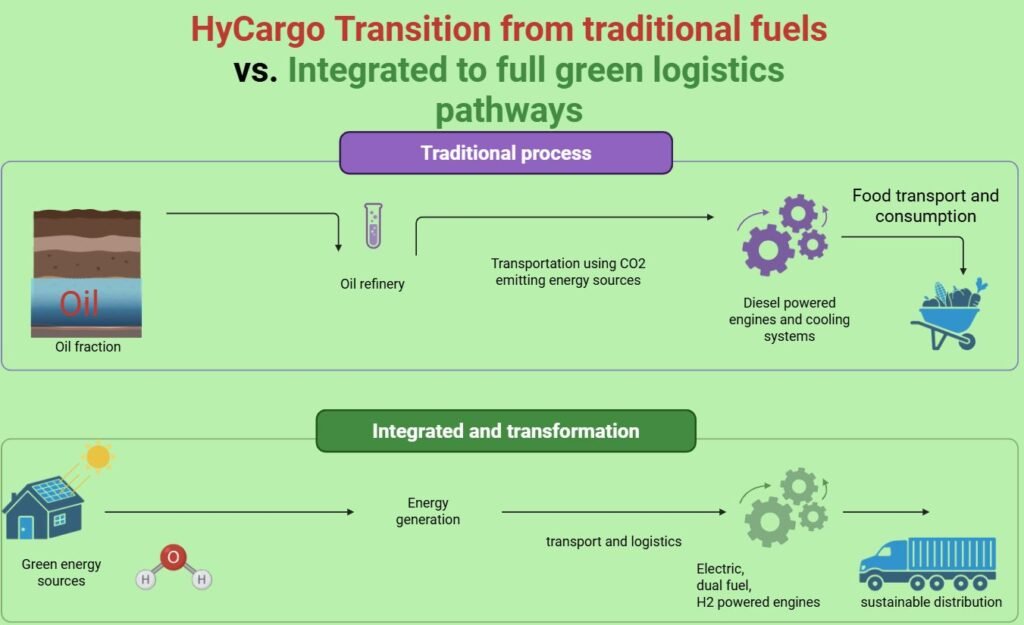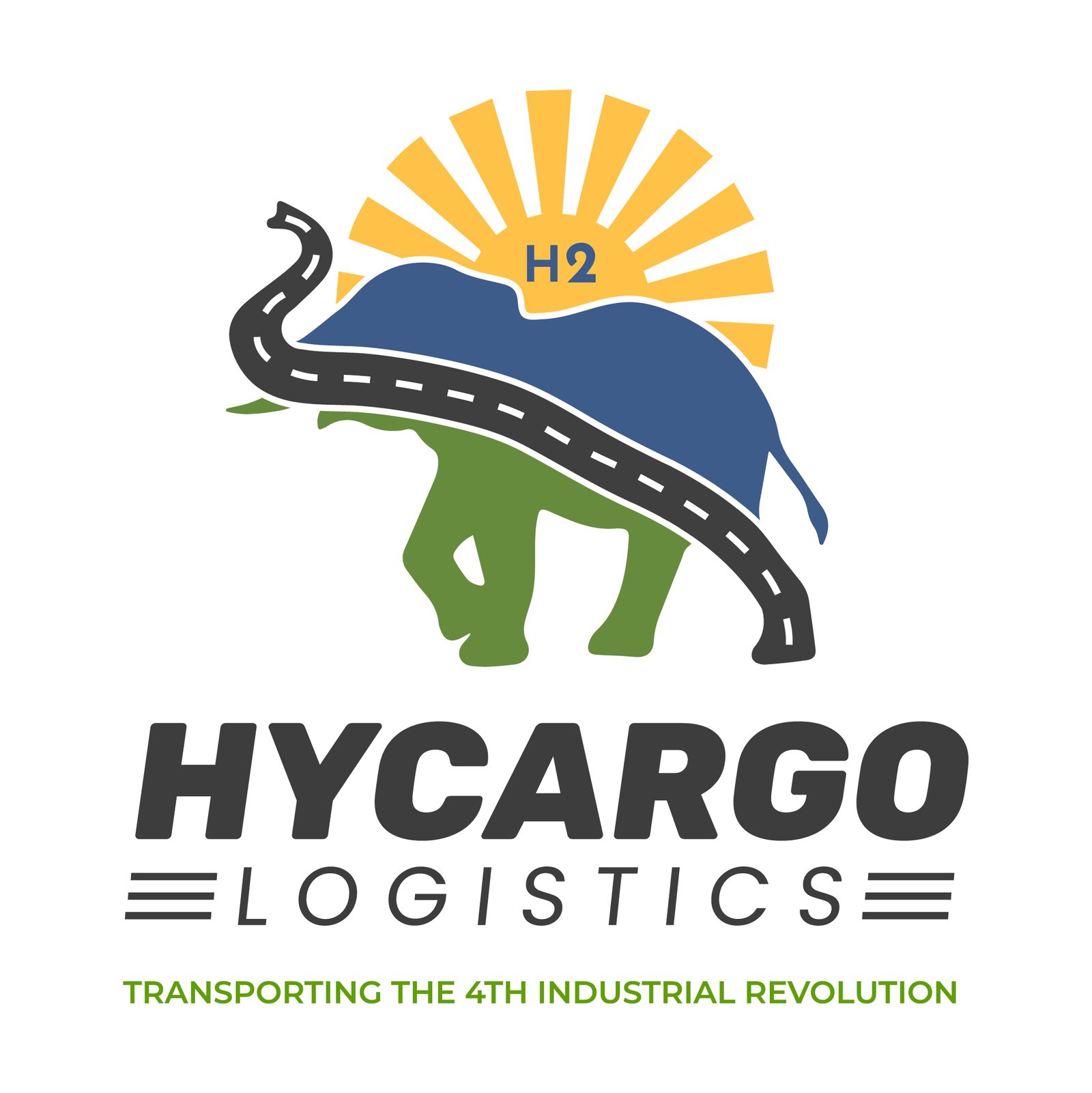Written by: Markus Shiweda
Content editor: Ndapunikwa M. Shilongo
Email: info@hycargologistics.com
The Role of Hydrogen in the Future of Logistics
The logistics sector stands at a critical inflection point, confronted with the dual imperatives of operational efficiency and ecological sustainability. As atmospheric carbon concentrations continue their upward trajectory, hydrogen has emerged as a compelling technological pathway for transforming transportation and supply chain networks. At HyCargo Logistics, we position ourselves as catalysts in this transformative journey across Southern Africa, where hydrogen-powered logistics—carefully integrated with other energy sources—represents not merely an alternative energy vector, but a fundamental reimagining of regional transport infrastructure.

Figure note: Comparison of traditional fossil fuel-based logistics pathways with HyCargo’s integrated green logistics model. The upper section illustrates the conventional process, beginning with oil extraction and refining, followed by CO₂-emitting transportation and diesel-powered engines for food transport and cooling, culminating in food consumption. The lower section depicts the integrated green pathway, where renewable energy sources enable hydrogen production, powering electric, dual fuel, and hydrogen engines for logistics and cooling, resulting in sustainable and low-emission distribution. This visual highlights the transition from conventional, carbon-intensive supply chains to a decarbonised, integrated logistics system.
Fundamentals of the Hydrogen Economy
Hydrogen is a clean, renewable energy source that produces zero emissions when used in vehicles. To explain the process in simpler terms, green hydrogen is generated by splitting water into hydrogen and oxygen using renewable energy from wind and solar power plants. These green energy sources are particularly abundant in southern Africa’s solar-rich landscapes—where green hydrogen presents a genuinely carbon-neutral energy carrier. The electrochemical conversion occurs without producing greenhouse gases or particulate matter, yielding only water vapor as a by-product. This molecular simplicity belies hydrogen’s profound implications for logistics systems predicated historically on fossil fuel combustion.
The global momentum towards hydrogen adoption transcends mere incremental improvement; it represents a fundamental reconfiguration of energy systems. Engineers have developed increasingly efficient electrolysis technologies, fuel cell systems with enhanced power density, and innovative storage solutions addressing hydrogen’s volumetric challenges—advancements collectively creating a technological ecosystem capable of supporting widespread logistic applications.
The Thermodynamic and Operational Advantages for Logistics Systems
Traditional logistic operations contributes disproportionately to atmospheric carbon loading through their dependence on diesel-powered transport and energy-intensive cold chain infrastructure. A comprehensive analysis of hydrogen-powered alternatives reveals several distinct advantages from both thermodynamic and operational perspectives:
- Complete Combustion Pathway Transformation: Hydrogen fuel cells electrochemically convert hydrogen directly to electricity with higher efficiency, surpassing internal combustion engines. The sole emission—water vapour—represents a paradigm shift in transport-related environmental impact.
- Operational Continuity and Range Extension: While battery-electric systems faces prolonged recharging cycles, hydrogen refuelling is not significantly different from conventional fuels, and it is expected to matching diesel vehicles’ operational range. This characteristic proves particularly significant for Southern Africa’s long and extended logistics corridors and cross-border networks.
- Systemic Integration Potential: Hydrogen’s versatility extends beyond powering vehicle engines to refrigeration systems, enabling holistic decarbonisation of logistics infrastructure. Hydrogen fuel cells can power refrigeration units in transport vehicles and warehouses, eliminating the need for diesel generators.
HyCargo’s Strategic Implementation in Namibia and southern African Context
HyCargo Logistics applies rigorous systems thinking to redefine logistics operations throughout Namibia and the broader Southern African region. Our strategic framework adapts hydrogen technologies across our operational spectrum, from transportation to warehousing and cold storage facilities. This may sound ambitious and of a business risck, but our commitment to a well-staged transition will enable us to avoid major operation disruption and services delivery to our customers.
In doing so, we are deploying the next-generation hydrogen-powered fleets designed specifically for African operating conditions and infrastructure constraints. Therefore, we are engaging with regional hydrogen producers to secure sustainable supply chains and supporting the development of critical refuelling infrastructure—exemplified by our involvement with the pioneering green hydrogen stations in Walvis Bay, Namibia.
Our specialised cross-border logistics team is trained on both general cargo and temperature-controlled supply chains. This knowledge base is being systematically expanded to integrate hydrogen-specific operational protocols and safety frameworks. Our roadmap establishes concrete targets: complete transition to renewable-powered cooling systems and 70% green-fuel propulsion by 2032. HyCargo Logistics will be committed to evidence-based implementation strategies, deploying hydrogen technologies strategically where they offer economical advantages while maintaining operations. Our approach combines practical logistics expertise with scientific rigor, ensuring that our transition to hydrogen aligns with technological readiness levels and infrastructure development.
For more on our sustainable logistics solutions and how we support local producers to the markets contact HyCargo Logistics.




